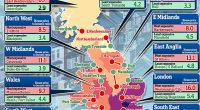
Rental scams are on the increase thanks to students hunting accommodation and a huge supply and demand gap, experts warn.
The number of rental scam reports to Action Fraud hit 541 last month and is likely to be the tip of the iceberg, with the majority of scams going unreported.
And cases are set to increase through August and September thanks to a seasonal surge of renters.
Scammers are looking to exploit the rental desperation, with social media awash with dodgy adverts and fake listings.


Warning: Scammers could exploit students looking to find an affordable place to rent
Rental social media groups have become a go-to source of rooms to rent for students and young professionals, often inexperienced renters or those simply moving out of the family home for the first time.
They offer a place for landlords and tenants to post available rooms and properties to rent or sublet and have become a hub for scammers looking to pounce.
Scammers will post the details of a supposed property in Facebook and Gumtree groups, providing images and even videos of the flat or house – and The National Association of Property Buyers says there has been a huge increase of such activity in recent months.
Where tenants have made a post saying that they are looking for a room, scammers will often respond asking for the poster to message them privately.
They will then communicate with the potential tenant and ultimately manipulate them into paying a deposit.
Ben Twomey, chief executive at Generation Rent, said that ‘scammers are active across all social networks, so renters need to be careful.’
He added: ‘The desperation that many people feel because of the chaos of the renting market plays right into the scammers’ hands, so make sure when you are looking for somewhere to rent you stick to recognised websites and remember that social media posts that sound too good to be true usually are.’
It comes as the number of tenants signing up with a lettings agent to find a new home showed a ‘sizeable jump’ in July.
Numbers were up almost 38 per cent annually, with the trend showing ‘no signs of slowing down’, according to trade body Propertymark.
It said 187 prospective tenants registered per branch on average in July this year, compared to 127 a year earlier.
Jonathan Rolande, property expert and commentator at the NAPB, said that the general trend towards rental frauds has resulted from a ‘shortage of properties’ and that there are now up to 20 applicants per letting.
This has resulted in a market which allows landlords to ‘call the shots’, said Rolande. He said that ‘landlords and agents can be very dismissive of anyone but the most seemingly reliable tenant.’
This means that ‘those with adverse credit history, low incomes, a reduced deposit, receiving benefits or even simply those with children are forced to look elsewhere to find a home.’
Many of these people will turn to Facebook groups or other social platforms as they become ‘more desperate’.
A spokesman at the National Residential Landlords Association said: ‘Unfortunately, so called “fake landlord scams”, in which criminals deceive prospective tenants into handing over money for a property they do not own or have the right to let are becoming more common.
‘Neither the NRLA nor anyone associated with the organisation would correspond with a tenant or prospective tenant in this way.’
They advised that prospective tenants search for landlords who are members of a legitimate association such as the NRLA and that ‘legitimate landlords will not try and pressurise tenants into making rash decisions.’









